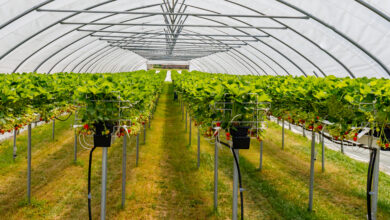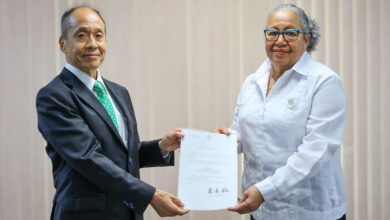This is the conclusion of a two-part interview with former Agriculture Minister Dr Christopher Tufton. Part one was published on Sunday, July 10.
DR Christopher Tufton remembers taking heavy flak for the sugar industry divestment programme and the introduction of the Farmers' Markets during his tenure as agriculture and fisheries minister but remains convinced that his actions were justified.
In fact, he marks both projects as among the Government's major achievements that have respectively saved jobs and given consumers and farmers options.
“The sugar industry is a milestone achievement for us,” Tufton told the Sunday Observer in an interview a few days after he was reassigned by Prime Minister Bruce Golding to the Ministry of Industry, Investment and Commerce in a Cabinet shuffle earlier this month.
Tufton recalled that when he took over as agriculture minister after the 2007 general election the efforts by the previous government to divest the sugar industry had failed, even as the factories gobbled up more than $20 billion in taxpayer funds in six years.
“It was clear that this thing was going to die a slow and painful death,” he said. “It took a lot, and I have to give a lot of credit to Aubyn (Hill).”
Hill, a former banker, was being paid a monthly consultancy fee of almost $1.9 million to lead the divestment process for the sugar factories/estates formerly owned by the state.
But news of his remuneration created a firestorm in November 2009 and questions were raised as to whether the country was getting value for money, given the high cost of maintaining the entities which were not producing.
In the Sunday Observer interview Tufton maintained his defence of the payment and pointed out that before the decision was taken to contract Hill, he was doing the job as a volunteer.
But that, Tufton felt, was unfair to the former banker, especially given the volume of work needed to sell the factories.
“When I started, it was $5 billion per year that the sugar industry was costing the taxpayers,” Tufton said, adding that about $2 billion of that was in bank charges “because we took so much overdraft the banks were making a killing. It was like Air Jamaica.”
Tufton said that after divestment talks with Brazilian firm Infinity Bio-Energy fell flat, in the face of the worldwide economic decline, and scorn was poured on him and his team, they went to Italy to talk to Eridania, which controlled 30 per cent of the Italian market, but was losing market share because beet farmers were going out of business as a result of subsidies in Europe drying up.
After making the investment pitch, the three-man team of himself, Hill and Robert Levy was told by the Eridania officials that they had to do their due diligence, which would take about six months.
But the time required by the Italians would result in a lockdown of the industry, as there remained only a month to start the crop and the Cabinet had no money to pump into the sector.
“This is an industry that employs over 30,000 people and is about 40 per cent of the Westmoreland economy, so it would be a disaster,” Tufton said.
“So we withdrew, talked about it, and went back into the room and I said, why don't you prefinance this crop? Give us the funds and we will give you the sugar; you refine the sugar and defend your market position in Italy, because you're running out of sugar, and I get at least a lifeline to carry me for another year while I negotiate a sale.
“They said they would think about it. When we landed in Jamaica they called and said “give us a proposal”. We spent two days working through the nights and sent the proposal. Within a week, they gave us US$15 million. That is how the sugar company was held,” said Tufton.
“Now, the Opposition cuss us, saying we negotiated a cheap price; the truth of the matter is that if a man was giving you a half a loaf you would take it, because the alternative to that was that the thing would have been shut down,” he added.
The sugar market, he noted, has been very good over the last two years “and it's going to be excellent next year”.
“Europe has dried up, and the global demand is out of whack. So anybody in the sugar business now will make money next year and the next couple of years because there's not enough supply,” he said.
The St Thomas and Trelawny sugar estates were divested in July 2009 to the Golden Grove Sugar Company and Everglades Farms Limited respectively, while the Chinese firm Complant bought Frome, Monymusk and Bernard Lodge a year later for just over US$10 million, and leased approximately 30,000 hectares of sugar lands to increase the production of cane.
“So we have brought the thing to a point where St Thomas is making 50 per cent more sugar than they did last year under the new ownership and they have spent over $1.5 billion to refurbish. They have put in close to another 2,000 acres and they seem to be comfortable that they're moving ahead,” said Tufton.
“Trelawny is working and refurbishing. They expect that they will have a factory up and running, if not by the end of this year, certainly shortly after, and they're planting out. They'e even exploring the possibility of organic sugar.
“The Complant guys, we're still talking to them to finalise for August, but the replanting has started.”
He admitted, however, that while this year's sugar crop will increase by more than 20 per cent over last year's, the country will not see the benefits that it would like because “we are still locked into a price, because we had to prefinance”.
The recommendations of the sugar industry enquiry, which was established to restructure the sector, are being implemented, Tufton said, and pointed out that a few weeks before the interview he was at Frome handing out certificates of ownership to the sugar workers who had to be relocated off the lands leased to Complant.
“What we are doing is that we are putting the workers on other lands, selling them the land at good prices, giving them titles for their land, because before that they didn't own the lands on which they lived,” he said.
“We are restructuring the health services, the schools that were once supported by the factories through a combination of Government of Jamaica and European Union money. So the restructuring and transformation is holistic, it's not just about the viability of the business through private sector investment. It's also about how we restructure the communities to ensure that the stakeholders in the communities are given a fair shake, but it's going to represent, over the next five years, a massive transformation of the industry which three years ago would be unheard of,” he said.
On the issue of the farmers' market Tufton is resolute.
“The data justify the farmers' markets,” he insisted. “For one, the farmers get a chance to have an option than just to depend on the middle man. Secondly, the farmers also interact with buyers, which gives them a better idea as to what to do to satisfy a marketplace so they become more sensitive to the market. Thirdly, it does get rid of excess capacity, as it has over the last few months. If we never had the farmers' markets over the last couple of months, where over $100 million has been sold and over 150,000 people passed through the series of markets, we would have had some demonstration about glut.”
He referred to criticisms from market vendors, acknowledging that not everyone was pleased with the concept, however, he pointed out that the markets were held only one day per month and the consumers love them.
“We see it as an achievement,” Tufton said. “We see it as an addition to the menu of options that consumers and farmers have, and it introduces a level of competitiveness internally that will discourage price gouging and exploitation and manipulation of both farmers and consumers by middlemen. My conviction is strong on that, despite what some say.”
Tufton also appeared particularly proud of his rice project which, he said, is “poised for take-off” and will create an estimated 500 jobs in the initial stage.
“We're well advanced with it, and I know my successor, Minister (Bobby) Montague, will carry it through,” said Tufton. “We have a Rice Growers' Association now formed. We've identified about 15,000 acres. We got a donation from ADM (Archer Daniels Midland Company, one of the largest agricultural processors in the world) for US$300,000 and have ordered rice equipment — two harvesters — which are coming in this month.”
He said that currently, about 500 acres of rice are being grown across Jamaica, coming from just under 50 acres two years ago, and the ministry has arranged for the Rice Growers' Association to lease from Wallenford one production line at Torrentum (the coffee processing plant in Clarendon built by the Japanese some years ago).
“It's a huge building with three independent production lines,” he explained. “The processing of rice and coffee is almost the same, so what we have done is separated one of the independent production lines and are leasing it to the Rice Growers' Association.”
Rice production, he estimated, could result in significant foreign exchange savings for Jamaica. “We import about 100,000 tons costing about US$60 million to US$70 million, that's 10 per cent of our food import bill, so we can save on the foreign exchange while creating jobs,” he argued.
Tufton also pointed to the Pepper Mash Project as another success, boasting that “for the first time in a long, long time Jamaica does not have to import pepper mash to make hot pepper sauce because we have put in place nurseries to grow the peppers”.
He noted as well that the new pepper mash facility, for which ground was broken at Hounslow this month, and which will be leased by GraceKennedy, will result in that firm contracting over 100 farmers to deliver the produce.
Among the other programmes he highlighted as successes were:
– The School Garden Programme that, he said, is now in more than 500 primary and high schools and which is sensitising students about the importance of agriculture while promoting the eat Jamaican campaign.
– The Coffee Divestment Programme which, in the case of Mavis Bank started before his time and is being finalised now, while he expects that Wallenford will be sold “during the course of this year”.
– A review of the Jamaica Agricultural Society (JAS) to restructure it to become more lean and efficient and to focus on its core mandate of being a lobby group for farmers.
– The restructuring, with the JAS, of agricultural shows, phasing out the non-agricultural activity. “So Denbigh this year is going to have a food village where people can taste Jamaican food prepared by chefs using local herbs and spices and other ingredients,” Tufton said, adding that the entertainment component of the shows will be “more wholesome family events”.
– The ALIGN (Arable Lands Irrigated and Growing for the Nation) Programme which, he said, has resulted in over 7,000 acres of both Government and privately owned land that were idle being brought back into production over the last 18 months.
– The promotion of cassava, over which he received a lot of criticism and ridicule early in his tenure. “You see what has now happened to cassava. It is now cassava chips, regularly being consumed,” Tufton quipped.
– Drip irrigation technology, which, he said, is now being utilised by the more sophisticated open field farmers and who “are getting as good results” as those using greenhouse technology.
“One of the things that we have done is to raise the profile of the ministry,” he argued. “When I came on board, the general perception was that agriculture was like a bastard child of the economy. But I think what we have been able to do is create believers in the industry and to push the food security agenda and to push the success stories and the opportunities in a way and the benefits of supporting and consuming local that have made it a topical issue and literally created interest among so many people.
“It is that type of belief and perception which has changed that has created an interest that has propelled and driven follow-up activity — whether investor or consumption activity. There is a foundation to it. People have to believe in what you're doing.”
Tufton also expressed full confidence that his successor will build on the achievements of the ministry, even as he admitted that there's a lot more work to be done and not everyone was satisfied.
“But,” he argued, “we think that as a Government, supported by the Cabinet, we have taken some steps that will position the sector to move forward. It's a process, not an event.”





